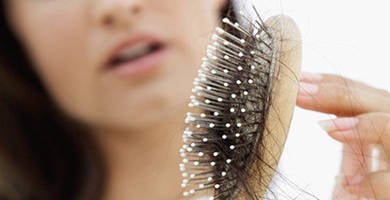Diffuse alopecia: causes and treatment
By Prof. Dr. Soner Tatlidede 2020-10-02

Diffuse alopecia is a type of alopecia that can affect both head and other areas and where capillary density is progressively lost: hair loses strength, becoming thinner and more fragile, and ends up falling out, even making some areas completely devoid of hair.
This condition is indifferent to gender: that is, diffuse alopecia is as common in men as it's in women, although it usually has different causes in the latter. Many people interested in the cost of a hair transplant in Turkey do it so just because they suffer from this type of alopecia; but, is hair transplant a solution? What treatments are effective? What causes this type of hair loss? How do I know if I have diffuse alopecia? Let's talk about it.
Causes of diffuse alopecia
In diffuse alopecia, also called sometimes diffuse unpatterned alopecia (DUPA), there is a progressive reduction of hair follicle size, which causes hair to loss strength and in the end falling out; however, no irritation or alteration is observed on the scalp.
There are many causes for diffuse alopecia; not just physical or derived from diseases or health problems, but also psychological; among other causes we can highlight:
- Intestinal diseases: not only these, but also kidney or liver failure can trigger this type of alopecia.
- Hormonal changes: these are in fact one of the most common causes, especially among women (pregnancy, childbirth, menopause, etc).
- Problems in the thyroid gland: precisely, because this gland is linked to hormone production.
- Eating problems: diet has a great influence in our hair health, and if insufficient it can trigger diffuse alopecia.
- Stress: stress is also one of the most common causes for this alopecia; in this case, the initial treatment should be psychological so that patient is able to reduce the level of stress.
- Medications: some treatments based on certain particularly aggressive medications can cause damage to follicles and hair loss.
Does this condition affect women?
One of the main characteristics that differentiates this type of alopecia, is that it occurs equally in men than in women; there are documented cases in which it has appeared at puberty, but it is commonly diagnosed in adults, from the age of 30.
Diffuse alopecia in men can appear for various causes, so a diagnosis of each particular case is necessary so that a proper treatment can be prescribed to recover follicles and stimulate hair growth; however, diffuse alopecia in women, although it can also have the same causes as in men, is triggered in most cases by hormonal alterations.
Main symptoms
We all lose hair every day, it is something very normal; however, diffuse alopecia can be identified because hair loss is much greater than usual, with more than 100 hairs falling in a single day; at the same time, we observe that hair in our scalp is thinner, drier and weaker, and low density areas will appear over a period of several months.
Different types of diffuse alopecia can be differentiated depending on the area where it appears: frontal or lateral diffuse alopecia (on the front of the head, or on the sides), diffuse alopecia areata (more aggressive and spread over several areas), diffuse patterned alopecia (caused by inherited genetic factors), etc.
Another important symptom is when hair loss occurs in various areas of the body (not just on the head). You must bear in mind that early diagnosis is important to prevent density loss from increasing. In women, the problem in diagnosis - as scientific studies indicate - is to differentiate diffuse alopecia from pattern hair loss or from telogen effluvium (the latter also related to cases of hair loss due to coronavirus), which are also common causes of female hair loss.
The important thing is to point out that diffuse alopecia, even when it has become chronic (something very common), can be reversible with the correct treatment, being able this to recover follicles in the affected areas and making hair to grow back.
What is the treatment for diffuse alopecia?
In most cases, the treatment of diffuse alopecia involves necessarily treating the diseases or pathologies that cause it; since in this type of alopecia follicle is still alive, it is possible to completely reverse hair loss. Besides, there are treatments such as PRP (Platelet Rich Plasma) that are able not just to stop hair loss, but also to stimulate hair growth.
In any case, it is important that each patient is diagnosed by a specialist who analyzes the causes of that particular case, and prescribes a personalized treatment seeking to eliminate or reduce those causes and restore the activity of follicles.
Hair transplants are also a common and effective solution for patients with diffuse alopecia to regain original hair density. At Clinicana we are specialists in all types of hair treatments, and the most recommended hair clinic in Istanbul: check it out by reading our patients' reviews on their hair transplant in Turkey. Ask us for a free consultation with no obligation: get your hair back!









